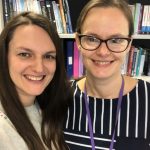The Centre holds a regular series of Visiting Speaker research talks. We invite academics and practitioners working at universities and in a variety of practice-based settings around the UK to present their current research and practice.
These talks enable staff, students and members of the public to be kept up-to-date with research and practice in psychology. The talks are free and no booking is required. We also live tweet from these talks using the #StaffsVSS hashtag. All staff, students, and members of the public are welcome to attend!
2018/2019 Visiting Speaker Series
The Staffordshire Centre for Psychological Research: ShowcaseProf. Karen Rodham, Dr. Rob Dempsey & Dr. Sarah Rose Staffordshire Centre for Psychological Research, Staffordshire University Come and join the Staffordshire Centre for Psychological Research for a showcase series of short talks showcasing research conducted by academic staff in the Department of Psychology! Featured talks include the psychology of pain (Professor Karen Rodham), using photovoice to understand wellbeing (Dr Rob Dempsey), and preventing dog bites in children (Dr Sarah Rose). The talks are open to all staff, students and the general public. Talks will start at 4pm on Thursday 27th September in R002, Ground Floor Lecture Theatre, Science Centre, Stoke-on-Trent. No need to book, just turn up! Host: Dr Richard Jolley (r.jolley@staffs.ac.uk) Date: 4pm-5pm, Thursday 27th September 2018 Venue: R002 Science Centre Lecture Theatre (ground floor), Staffordshire University, Stoke-on-Trent, ST4 2DF. |
Children’s Drawings to Associate Professor: A career in children’s artDr. Richard Jolley, Staffordshire University After completing my degree in psychology (University of York) and my PhD in child We live in a pervasive and varied pictorial world (drawings, paintings, photographs, film), with its multiple purposes (illustration, design, aesthetics, beauty, advertising, entertainment) serving numerous professions (artists, designers, photographers, architects, cartoonists). It is within childhood that the skills in the visual arts are learned, with the psychological and educational benefits accrued during the process of learning. Throughout my academic career I’ve studied children’s making and understanding of pictures, and in this talk I will be presenting the key findings from over 25 years of multidisciplinary research, which includes varied psychological perspectives (developmental, cognitive, educational, clinical, aesthetic and cross-cultural). In so doing I will be giving some insights into the profession of an academic, in the hope that it will inspire those considering this career and those who wish to be promoted within it! Host: Professor Karen Rodham (karen.rodham@staffs.ac.uk) Date: 4pm-5pm Thursday 11th October 2018 Venue: R002 Science Centre Lecture Theatre (ground floor), Staffordshire University, Stoke-on-Trent, ST4 2DF. |
Arts for Health: How a prescription of art can support patient health and wellbeingDr. Rachel Sumner, University of Gloucestershire Dr Rachel Sumner is a Senior Lecturer in Psychology at the University of Host: Dr Gemma Hurst (g.l.hurst@staffs.ac.uk) Date: 4pm-5pm, Thursday 18th October 2018 Venue: R002 Science Centre Lecture Theatre (ground floor), Staffordshire University, Stoke-on-Trent, ST4 2DF. |
Understanding maths anxiety in adult and younger populations.Dr. Dominic Petronzi, University of Derby I completed my BSc, Masters and PhD all at the University of Derby and Maths anxiety – or a fear of working with numbers – has been well researched in adult populations and has a strong association with lower maths performance and may even define career decisions. But we’re only just beginning to understand how and why this develops in children. Research suggests that this can be when numbers are first encountered and many children’s performance starts to decline from as early as 4 years of age. This presentation will look at the distinctiveness of maths anxiety, the range of factors that contribute to it’s emergence and the complexity of these on an individual basis, as well as understanding the emotional element of maths anxiety and how important brain components are compromised by intrusive thoughts that lead to a performance deficit. We’ll also discuss the measurement of maths anxiety, and explore direct insight from young children surrounding a range of factors that influence their early experiences and attitudes towards maths. Host: Dr Michael Batashvili (michael.batashvili@staffs.ac.uk) Date: 4pm-5pm, Thursday 8th November 2018 Venue: R002 Science Centre Lecture Theatre (ground floor), Staffordshire University, Stoke-on-Trent, ST4 2DF. |
Nice guys don’t finish last: An evolutionary perspective on prosociality in mate choiceDr. Manpal Bhogal, University of Wolverhampton I completed my PhD at the University of Wolverhampton, worked at Coventry Evolutionary Psychology has long explored what traits we seek in a partner to maximise reproductive success. Prosociality has been argued to be an attractive feature in a romantic partner, due to its indirect phenotypic qualities, often signalling a good partner, and good parental qualities. However, prosocial behaviour is not limited to altruistic or cooperative acts. In this talk, I will be providing an overview of the empirical evidence, including my own work over the past 7 years, suggesting prosociality has evolved as a mating signal, evolved to increase our chances of attracting, securing, and reproducing with long-term mating partners. In this talk, I will be unpacking the facets of prosociality, primarily important in mate choice contexts. Host: Dr Rob Dempsey (robert.dempsey@staffs.ac.uk) Date: 4pm-5pm, Thursday 22nd November 2018 Venue: R002 Science Centre Lecture Theatre (ground floor), Staffordshire University, Stoke-on-Trent, ST4 2DF. |
Environmental influences on eating behaviour. How and why are children influenced?Dr. Maxine Sharps, Coventry University
Host: Dr Rachel Povey (r.povey@staffs.ac.uk) Date: 4pm-5pm, Thursday 24th January 2019 Venue: R002 Science Centre Lecture Theatre (ground floor), Staffordshire University, Stoke-on-Trent, ST4 2DF |
The work of writing: Raiding the inarticulateDavid Galbraith, University of Southampton
Host: Dr Richard Jolley (r.jolley@staffs.ac.uk) Date: 4pm-5pm, Thursday 7th February 2019 Venue: R002 Science Centre Lecture Theatre (ground floor), Staffordshire University, Stoke-on-Trent, ST4 2DF |
Investigating the temporal dynamics and complexity of self-harmProfessor Ellen Townsend, University of Nottingham
Host: Professor Karen Rodham (karen.rodham@staffs.ac.uk) Date: 4pm-5pm, Thursday 21st February 2019 Venue: R002 Science Centre Lecture Theatre (ground floor), Staffordshire University, Stoke-on-Trent, ST4 2DF |
Too much of a “good” thing: preschoolers and portion sizesDr. Samantha Caton, University of Sheffield Dr Sam Caton is a lecturer in Public Health at the University of Sheffield. She has a BSc Sam is a biological Psychologist with a broad interest in the area of appetite regulation, obesity and nutrition. The majority of Sam’s recent work focuses on eating behaviour, taste preference development and promotion of healthful eating in preschool children. In her talk Sam will present recent findings from a BBSRC DRINC funded grant entitled “Downsizing: using environmental prompts to understand healthy portion control and appropriate food servings in children, adolescents and caregivers”. Host: Dr Rob Dempsey (robert.dempsey@staffs.ac.uk) Date: 4pm-5pm, Thursday 7th March 2019 Venue: R002 Science Centre Lecture Theatre (ground floor), Staffordshire University, Stoke-on-Trent, ST4 2DF |
Breastfeeding & Health
|
 psychology (University of Birmingham) I joined the Department of Psychology at Staffordshire University in 1995 as a lecturer. I became Senior Lecturer in 1999 and Associate Professor in 2018.
psychology (University of Birmingham) I joined the Department of Psychology at Staffordshire University in 1995 as a lecturer. I became Senior Lecturer in 1999 and Associate Professor in 2018. Gloucestershire, and Staffs alumna, specialising in Psychobiology. Her work covers a variety of different fields but is centred on an interest in the ways that psychological experiences can change immunity and health. She has carried out research using experimental, observational, and secondary data methodologies looking at stress, nature/human interactions, arts and health, and hemispheric lateralisation. She will be talking about her work evaluating the efficacy and utility of arts prescriptions in primary care to support the health and wellbeing of patients with complex or long-term care requirements. As part of a growing movement of “social prescribing”, arts-on-prescription allow patients to be referred to non-medical interventions that can have tangible and meaningful medical benefits for the patients that participate. Rachel will be discussing a developing body of work carried out using the largest dataset of arts-on-prescription in the world, which has also contributed to the recent All Party Parliamentary Groupon Arts, Health & Wellbeing Inquiry Report.
Gloucestershire, and Staffs alumna, specialising in Psychobiology. Her work covers a variety of different fields but is centred on an interest in the ways that psychological experiences can change immunity and health. She has carried out research using experimental, observational, and secondary data methodologies looking at stress, nature/human interactions, arts and health, and hemispheric lateralisation. She will be talking about her work evaluating the efficacy and utility of arts prescriptions in primary care to support the health and wellbeing of patients with complex or long-term care requirements. As part of a growing movement of “social prescribing”, arts-on-prescription allow patients to be referred to non-medical interventions that can have tangible and meaningful medical benefits for the patients that participate. Rachel will be discussing a developing body of work carried out using the largest dataset of arts-on-prescription in the world, which has also contributed to the recent All Party Parliamentary Groupon Arts, Health & Wellbeing Inquiry Report. currently work as a Lecturer in Psychology. My PhD centred on children’s maths anxiety, exploring when this form of educational anxiety develops and what factors contribute to its emergence. A novel outcome of this research was the completion of the Children’s Maths Anxiety Scale UK (CMAS-UK).
currently work as a Lecturer in Psychology. My PhD centred on children’s maths anxiety, exploring when this form of educational anxiety develops and what factors contribute to its emergence. A novel outcome of this research was the completion of the Children’s Maths Anxiety Scale UK (CMAS-UK). University for 4 years, worked for HEFCE as a Research Associate, Lecturer in Psychology at Staffordshire for a year, and now a Lecturer in Psychology at Wolverhampton. I am also Editorial Board member for the Journal Current Psychology.
University for 4 years, worked for HEFCE as a Research Associate, Lecturer in Psychology at Staffordshire for a year, and now a Lecturer in Psychology at Wolverhampton. I am also Editorial Board member for the Journal Current Psychology. My main research interests lie within environmental influences on children’s eating behaviour. I am particularly interested in finding novel ways to increase children’s fruit and vegetable consumption. I started my academic career as a PhD student at the University of Liverpool in 2013. I worked with Dr Eric Robinson and examined social influences on children’s fruit and vegetable consumption. Following this I worked as a postdoctoral research associate at the University of Leeds with Prof. Marion Hetherington and Dr Charlotte Evans where I designed and trialled an intervention on social media to reduce young adults’ and adolescents’ portions of high energy-dense snack foods. I am currently working at Coventry University as a Research Associate where I am working on projects investigating nudging as a way of increasing children’s fruit and vegetable consumption, social influences on children’s eating behaviour, and a project investigating infant feeding in South-Asian communities. I am always looking to develop collaborations and work with researchers in the field so please feel free to get in touch.
My main research interests lie within environmental influences on children’s eating behaviour. I am particularly interested in finding novel ways to increase children’s fruit and vegetable consumption. I started my academic career as a PhD student at the University of Liverpool in 2013. I worked with Dr Eric Robinson and examined social influences on children’s fruit and vegetable consumption. Following this I worked as a postdoctoral research associate at the University of Leeds with Prof. Marion Hetherington and Dr Charlotte Evans where I designed and trialled an intervention on social media to reduce young adults’ and adolescents’ portions of high energy-dense snack foods. I am currently working at Coventry University as a Research Associate where I am working on projects investigating nudging as a way of increasing children’s fruit and vegetable consumption, social influences on children’s eating behaviour, and a project investigating infant feeding in South-Asian communities. I am always looking to develop collaborations and work with researchers in the field so please feel free to get in touch. I am currently Associate Professor in Psychology in the School of Education at the University of Southampton. Some of you may remember though that I was a Lecturer in Psychology at Staffs for many years. It is good be back! My main research interest is the psychology of writing and the development of understanding through writing. This involves basic research into the cognitive and social processes involved in writing, and is focussed on the development of a dual-process model of writing. Insights from this model are applied to research into the teaching of writing; the use of writing as a tool for learning, particularly in science learning; the effects of dyslexia on writing; and the therapeutic effects of expressive writing. My talk will outline the dual-process model of writing in its current form, review some of the evidence on which it is based, and explore the implications for the teaching of writing.
I am currently Associate Professor in Psychology in the School of Education at the University of Southampton. Some of you may remember though that I was a Lecturer in Psychology at Staffs for many years. It is good be back! My main research interest is the psychology of writing and the development of understanding through writing. This involves basic research into the cognitive and social processes involved in writing, and is focussed on the development of a dual-process model of writing. Insights from this model are applied to research into the teaching of writing; the use of writing as a tool for learning, particularly in science learning; the effects of dyslexia on writing; and the therapeutic effects of expressive writing. My talk will outline the dual-process model of writing in its current form, review some of the evidence on which it is based, and explore the implications for the teaching of writing. Ellen holds a BA Hons in Music from the University of Leeds and a PhD in Psychology from the University of Nottingham. She completed her postdoctoral work in the Centre for Suicide Research at the University of Oxford. Ellen is a Professor of Psychology at the University of Nottingham where she leads the Self-Harm Research Group, which investigates the psychological factors associated with self-harm and suicidality, and interventions that promote recovery. We use sequence analysis, the Card Sort Task for Self-Harm (CaTS), experiments, questionnaires, epidemiology, interviews and systematic reviews in our work which has influenced policy and practice for self-harm.
Ellen holds a BA Hons in Music from the University of Leeds and a PhD in Psychology from the University of Nottingham. She completed her postdoctoral work in the Centre for Suicide Research at the University of Oxford. Ellen is a Professor of Psychology at the University of Nottingham where she leads the Self-Harm Research Group, which investigates the psychological factors associated with self-harm and suicidality, and interventions that promote recovery. We use sequence analysis, the Card Sort Task for Self-Harm (CaTS), experiments, questionnaires, epidemiology, interviews and systematic reviews in our work which has influenced policy and practice for self-harm. . in Psychology (University of Leeds), M.Med.Sci in Human Nutrition (University of Sheffield) and completed her PhD at the University of Liverpool. Sam joined Public Health at Sheffield in 2013. Prior to this Sam was a lecturer in Biopsychology at the University of Bradford. Sam has held several post-doctoral positions both nationally and internationally; Germany (Ludwig Maximillians Universität, Munich, Department of Endocrinology), USA (Purdue University, West Lafayette, Indiana, Department of Psychology) and most recently in the UK (University of Leeds, Institute of Psychological Sciences).
. in Psychology (University of Leeds), M.Med.Sci in Human Nutrition (University of Sheffield) and completed her PhD at the University of Liverpool. Sam joined Public Health at Sheffield in 2013. Prior to this Sam was a lecturer in Biopsychology at the University of Bradford. Sam has held several post-doctoral positions both nationally and internationally; Germany (Ludwig Maximillians Universität, Munich, Department of Endocrinology), USA (Purdue University, West Lafayette, Indiana, Department of Psychology) and most recently in the UK (University of Leeds, Institute of Psychological Sciences).